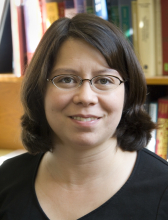Rachel Segalman received a B.S. in Chemical Engineering from the University of Texas at Austin in 1998 and a Ph.D. in Chemical Engineering from UCSB in 2002. Her postdoctoral research in conjugated polymer synthesis and properties took place at the Université Louis Pasteur in Strasbourg, France in 2003. She joined the faculty of UC Berkeley and Lawrence Berkeley National Laboratories in 2004 and then moved back to UCSB as a professor of Chemical Engineering and Materials in 2014. Her research focuses on controlling self-assembly, structure, and properties in functional polymers. Structure control over soft matter on a molecular through mesoscopic lengthscale is a vital tool to optimizing properties for applications ranging from energy (solar and thermal) to biomaterials. For example, while molecular structure affects the electronic properties of semiconducting polymers, the crystal and grain structure greatly affect bulk conductivity, and nanometer lengthscale pattern of internal interfaces is vital to charge separation and recombination in photovoltaic and light emission effects. Similarly, biological materials gain functionality from structures ranging from monomeric sequence through chain shape through self-assembly. Her group works to both understand the effects of structure on properties and gain pattern control in these inherently multidimensional problems. They are particularly interested in materials for energy applications such as photovoltaics, fuel cells, and thermoelectrics.
Phone: (805) 893-3709
Email: segalman@ucsb.edu
Office: 3341 EII

